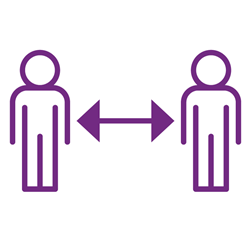
“(Social distancing efforts), combined with the supportive care of our clinicians and increased testing, will help reduce COVID-19’s impact on our communities.” — Tammy Lundstrom, M.D., J.D., SVP &CMO, Trinity Health, and also an infectious disease specialist.
LIVONIA, Mich. (PRWEB)
May 09, 2020
As we move from an acute to potentially chronic outbreak of COVID-19, Trinity Health wants to remind you of the importance of continuing social distancing. Social distancing is when people limit contact with others not in their immediate household and keep apart from others when in public.
COVID-19 has no vaccine or known cure, making social distancing one of the most helpful tools against the spread of this virus.
“Social distancing will likely be our next normal as we continue to flatten the curve,” said Tammy Lundstrom, M.D., J.D., senior vice president and chief medical officer, Trinity Health, who is also an infectious disease specialist.
As some stay-at-home restrictions have been easing across the country, it is important to help keep COVID-19 infection rates lower by following these recommendations, according to the Centers for Disease Control and Prevention (CDC):
- Handwash frequently for at least 20 seconds with soap and warm water, or use hand sanitizer with at least 60% alcohol
- Stay home as much as possible, including working remotely, if possible
- Keep six feet between you and others while in public
- Wear a mask while in public
- Do not touch your face with your hands
- If you feel ill, please contact your health care provider and seek immediate medical attention if you have difficulty breathing.
“These efforts, combined with the supportive care of our clinicians and increased testing, will help reduce COVID-19’s impact on our communities,” said Lundstrom.
As restrictions ease, Trinity Health wants to remind people that they may once again seek medical care for non-COVID-19-related issues, such as chronic conditions and some elective procedures or surgeries. As always, people should call 911 or seek immediate medical attention if they are experiencing symptoms such as severe chest pain, severe shortness of breath, uncontrolled bleeding, stroke-like symptoms or other life-threatening conditions.
If patients need to come in-person, safety protocols are in place to protect them and our caregivers, and Trinity Health has the needed personal protective equipment (PPE), COVID-free zones, screening and testing in place at our patient care facilities. COVID-free Zones are areas where we provide care only for people not known to have COVID-19 or COVID-19 symptoms.
To learn more about how Trinity Health is helping our communities deal with COVID-19, please visit http://www.trinity-health.org/coronavirus.
About Trinity Health
Trinity Health is one of the largest multi-institutional Catholic health care delivery systems in the nation, serving diverse communities that include more than 30 million people across 22 states. Trinity Health includes 92 hospitals, as well as 106 continuing care locations that include PACE programs, senior living facilities and home care and hospice services. Its continuing care programs provide nearly 2.5 million visits annually. Based in Livonia, Michigan, and with annual operating revenues of $19.3 billion and assets of $27 billion, the organization returns $1.2 billion to its communities annually in the form of charity care and other community benefit programs. Trinity Health employs about 125,000 colleagues, including about 7,500 employed physicians and clinicians. For more information, visit http://www.trinity-health.org. You can also follow us on Facebook or Twitter.
###
Share article on social media or email:

